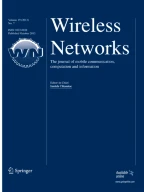Abstract
We consider single channel wireless networks with interference constraint among the links that can be activated simultaneously. The traffic flows are assumed to be single hop. Delay performance of the well known throughput optimal maximum weight link scheduling algorithm has been studied recently. In this paper, we study the relation between network topology and delay of maximum weight link scheduling algorithm. First, we consider 1-hop interference model. Under this interference model, an upper bound for the average delay of packets is derived analytically in terms of edge chromatic number of the network graph. Then the results have been extended to the case of general interference model. Under this model of interference, an upper bound for delay as a function of chromatic number of conflict graph is derived. Since chromatic number and edge chromatic number are network topology parameters, the results show that how the upper bound of delay is affected by network topology. Simulation results confirm our analytical relations.
Similar content being viewed by others
References
Tassiulas, L., & Ephremides, A. (1992). Stability properties of constrained queueing systems and scheduling policies for maximum throughput in multihop radio networks. IEEE Transaction on Automatic Control, 37(12), 1936–1948
Sharma, G., Mazumdar, R. R., Shroff, N. B. (2006). On the complexity of scheduling in wireless networks. In Proceedings ACM MobiCom (pp. 227–238). NY, USA
Tassiulas L. (1998). Linear complexity algorithms for maximum throughput in radio networks and input queued switches. In Proceedings of IEEE INFOCOM, vol. 2, pp. 533–539
Modiano, Eytan, Shah, Devavrat, Zussman, Gil (2006). Maximizing throughput in wireless networks via gossiping. In Proceedings of ACM SIGMETRICS, 34, vol. 34, no. 1, pp. 27–38.
Sanghavi, S., Bui, L., & Srikant, R. (2007). Distributed link scheduling with constant overhead. Proceedings of ACM SIGMETRICS, 35(1), 313–324.
Bui, L. X., Sanghavi, S., Srikant, R. (2009). Distributed link scheduling with constant overhead. IEEE/ACM Transaction on Networking, 17, 1467–1480.
Yi, Y., & Chiang, M. (2008). Wireless scheduling algorithms with o(1) overhead for m-hop interference model. In Proceedings of IEEE ICC, pp. 3105–3109.
Gupta, A., Lin, X., Srikant, R. (2009). Low-complexity distributed scheduling algorithms for wireless networks. IEEE/ACM Transaction on Networking, 17, 1846–1859.
David, A. (1983). A survey of heuristics for the weighted matching problem. Networks 13(4), 475–493.
Hoepman, J. H. (2004). Simple distributed weighted matchings. In In eprint cs.DC/0410047
Preis, R. (1998). Linear time 1/2-approximation algorithm for maximum weighted matching in general graphs. In In general graphs, symposium on theoretical aspects of computer science, STACS 99 (pp. 259–269). Springer: Berlin
Vinkemeier, D. E. D., & Hougardy, S. (2005). A linear-time approximation algorithm for weighted matchings in graphs. ACM Transactions on Algorithms 1, 107–122.
Chaporkar, P., Kar, K., Luo, Xiang., & Sarkar, S. (2008). Throughput and fairness guarantees through maximal scheduling in wireless networks. IEEE Transactions on Information Theory, 54(2), 572–594.
Wu, X., Srikant, R., Perkins., & James R. (2007). Scheduling efficiency of distributed greedy scheduling algorithms in wireless networks. IEEE Transactions on Mobile Computing 6, 595–605.
Abbas, A. M., & Kure, O. (2010) Quality of service in mobile ad hoc networks: A survey. International Journal of Ad Hoc and Ubiquitous Computing, 6, 75–98
Neely, M. J. (2008a). Order optimal delay for opportunistic scheduling in multi-user wireless uplinks and downlinks. IEEE/ACM Transaction on Networking 16(5), 1188–1199.
Neely, M. J. (2008b). Delay analysis for max weight opportunistic scheduling in wireless systems. In Communication, Control, and Computing, 2008 46th Annual Allerton Conference on, pp. 683–691.
Le, L. B., Jagannathan, K., & Modiano, E. (2009). Delay analysis of maximum weight scheduling in wireless ad hoc networks. In Information sciences and systems, 2009. CISS 2009. 43rd annual conference on, pp. 389–394.
Neely, M. J. (2009). Delay analysis for maximal scheduling with flow control in wireless networks with bursty traffic. IEEE/ACM Transaction Networking, 17(4), 1146–1159, ISSN 1063–6692.
Gupta, G. R., & Shroff, N. B. (2010). Delay analysis for wireless networks with single hop traffic and general interference constraints. IEEE/ACM Transaction on Networking, 18, 393–405.
Gupta, G. R., & Shroff, N. B. (2011). Delay analysis and optimality of scheduling policies for multihop wireless networks. IEEE/ACM Transaction on Networking, 19, 129–141.
Michelle, X. G., Son, I. K., Mao, S., & Li, Y. (2012). On frame-based scheduling for directional mmwave wpans. In INFOCOM 2012
Georgiadis, L., Neely, M. J., Tassiulas, L. (2006). Resource allocation and cross-layer control in wireless networks. Foundation Trends on Network 1(1), 1–144.
West, D. (2000). Introduction to graph theory, 2nd ed. Prentice Hall: Upper Saddle River, NJ
Author information
Authors and Affiliations
Corresponding author
Rights and permissions
About this article
Cite this article
Ghiasian, A., Saidi, H., Omoomi, B. et al. The impact of network topology on delay bound in wireless Ad Hoc networks. Wireless Netw 19, 237–245 (2013). https://doi.org/10.1007/s11276-012-0462-z
Published:
Issue Date:
DOI: https://doi.org/10.1007/s11276-012-0462-z
